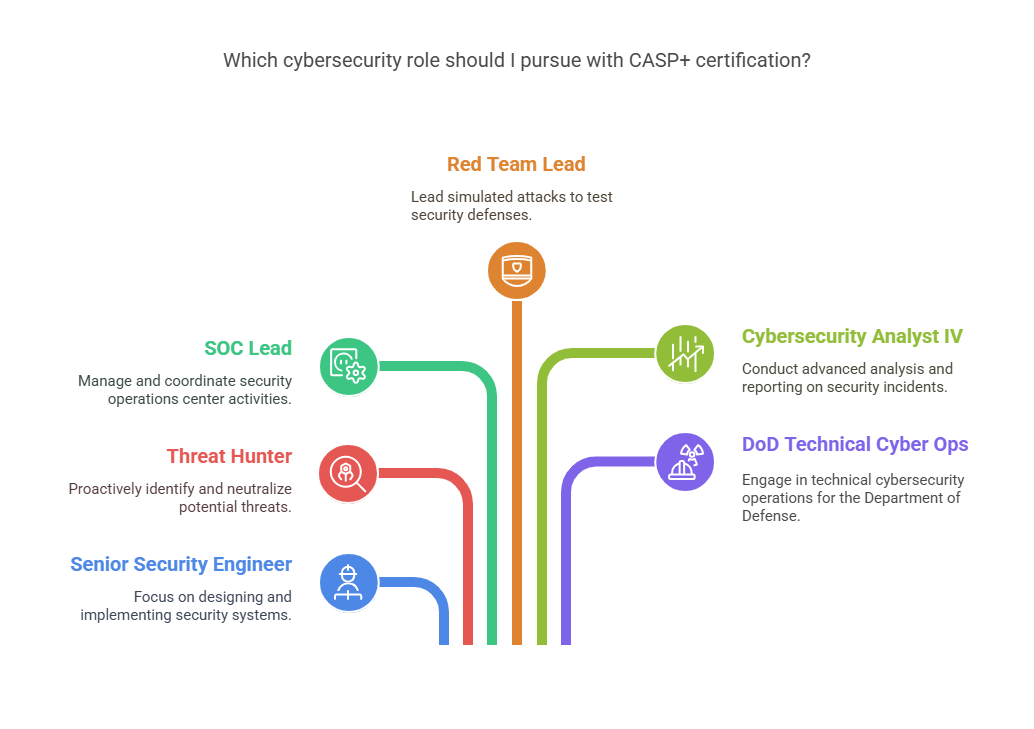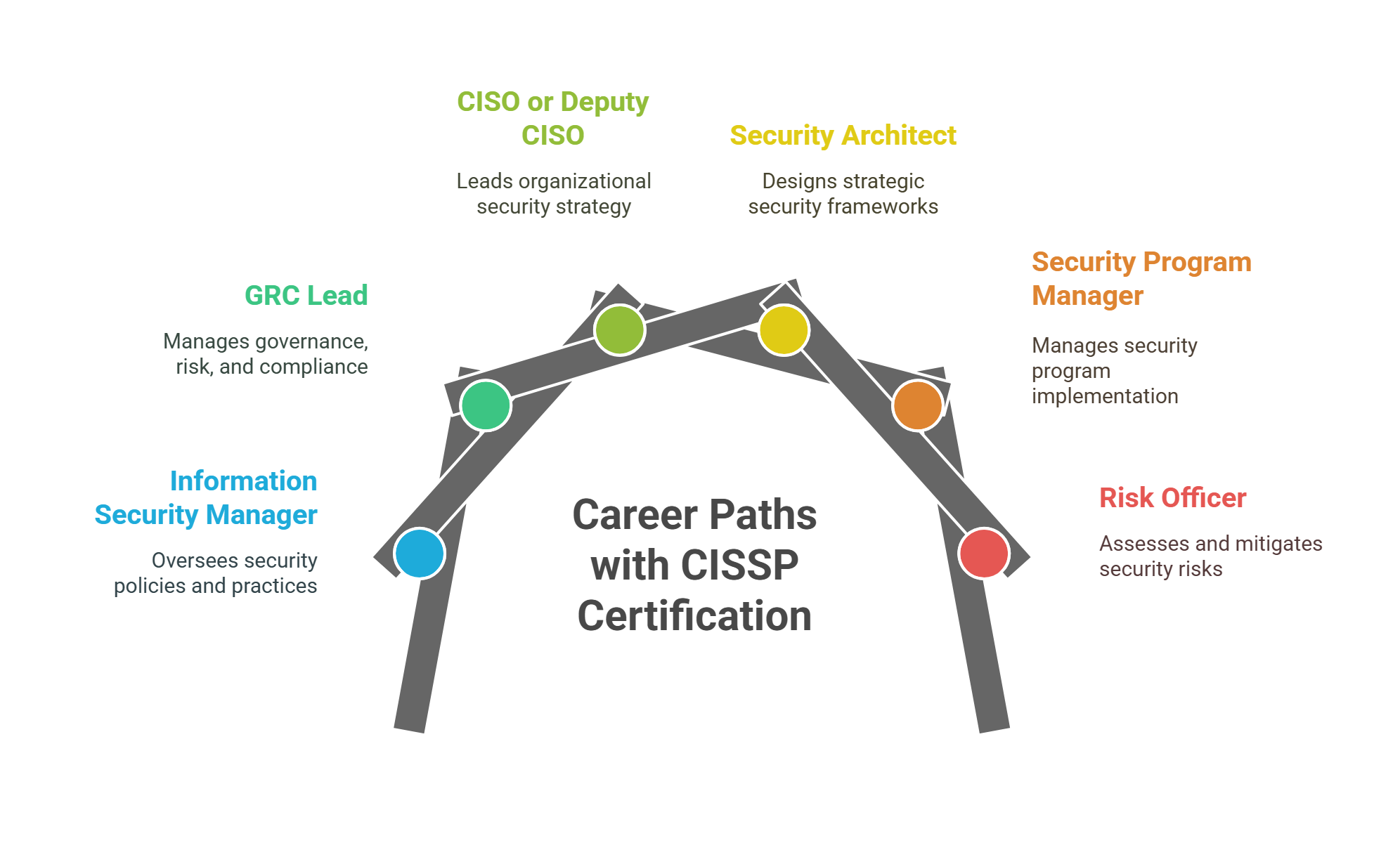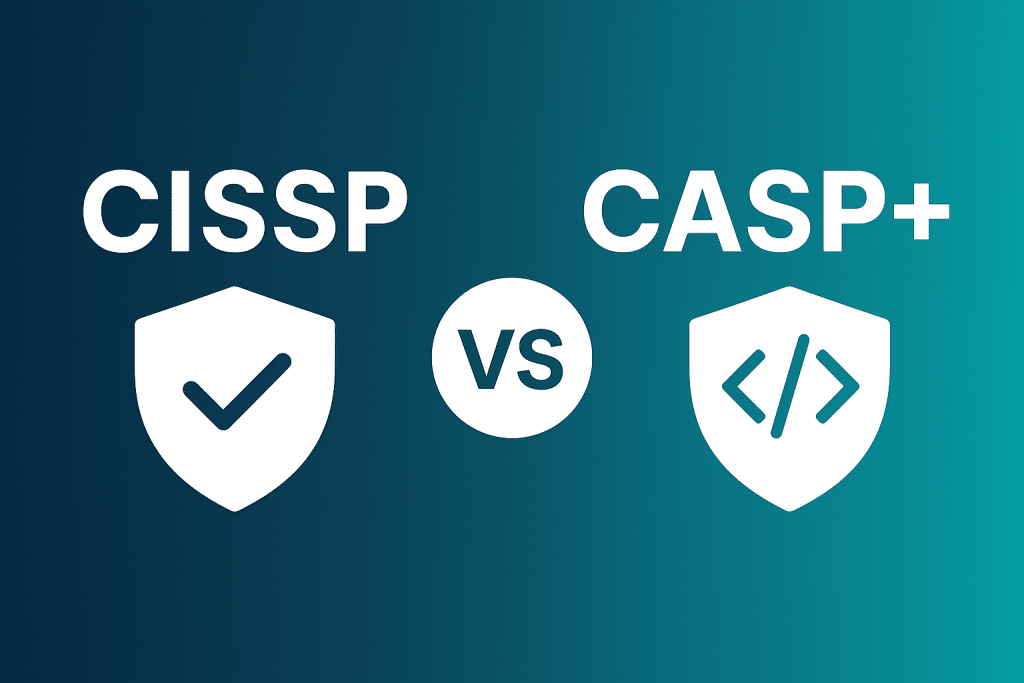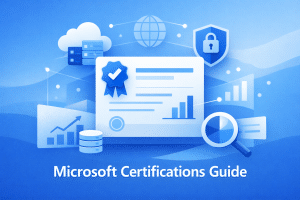If you’re stuck choosing between CISSP and CASP+, the first thing you need to know is they are not competing for the same kind of person, even though both require the cissp certification . On the surface, both are respected cybersecurity certifications. But once you peel back the marketing fluff, it becomes obvious, they’re aimed at completely different tracks in your career.
CISSP focuses on security leadership, governance, and high-level planning, including security architecture and to implement secure solutions. CASP+ focuses on advanced hands-on security engineering and technical implementation. If you’re ready to dive deep, check out The Ultimate CISSP Exam Guide in 2026 for a step-by-step roadmap. If you’re looking to manage teams, define security programs, and speak in risk language, aiming for leadership roles , CISSP fits better. If you’d rather stay technical, solve complex problems directly, and be the person fixing things, not delegating them, then CASP is where you should look.
It’s not about which cert is better. It’s about which one actually matches the kind of job cybersecurity professionals want to show up to.
CISSP vs CASP+ Certification Comparison
| Criteria | CISSP | CASP+ |
| Full Name | Certified Information Systems Security Professional | CompTIA Advanced Security Practitioner |
| Issued By | (ISC)² | CompTIA |
| Target Audience | Experienced security professionals (Managerial + Technical)er | Advanced-level technical professionals |
| Experience Requirement | Minimum 5 years in at least 2 of 8 domains | Recommended 10 years IT experience, 5 years in security |
| Exam Duration | 4 hours | 165 minutes |
| Number of Questions | 125–175 (adaptive) | 90 (multiple choice and performance-based) |
| Exam Format | CAT (Computer Adaptive Testing) | Multiple-choice & performance-based |
| Focus Area | Security leadership, governance, and architecture | Hands-on technical skills in enterprise security |
| Certification Validity | 3 years (requires CPEs to maintain) | 3 years (can be renewed with CEUs) |
| Difficulty Level | High (broad and deep knowledge required) | Moderate to high (very technical) |
| Best For | S Certified Information Security Manager, CISOs, Consultants | Security Engineers, Architects, Analysts |
The Roles These Certifications Lead To Are Not the Same
CISSP and CASP are rarely listed for the same job listings or descriptions, especially when it comes to security assessment . That should tell you something. Each cert opens doors, but those doors lead to very different kinds of rooms.
For those more interested in leadership and governance-heavy roles, our CISSP vs CISM certification comparison offers a closer look at how these two management-focused paths differ.
With CASP+, expect to see job titles like:
- Senior Security Engineer
- Threat Hunter
- SOC Lead
- Red Team Lead
- Cybersecurity Analyst IV
- DoD Technical Cyber Ops
These are deeply technical roles where you’re expected to perform, not just plan.

With CISSP, you’re more likely to see:
- Information Security Manager
- Governance, Risk & Compliance (GRC) Lead
- CISO or Deputy CISO
- Security Architect (at the strategic level)
- Security Program Manager
- Risk Officer
CISSP certification demonstrates that you get into high-level discussions; budget, policy, legal risk, stakeholder alignment.

You don’t study for CISSP or information security management if you still want to spend most of your day scripting or configuring firewalls, as the focus is more on risk management. And you don’t study for CASP if you want to lead enterprise-level cybersecurity planning. Don’t fall into the trap of thinking CISSP is always better just because it’s older or more famous.
Which Exam Is Tougher Depends on What Certified Professionals are Good At
If you’re wondering which exam is harder, well, you’ve got to define “hard.”
CISSP exam traits:
- Length: 3 hours (CAT format), up to 150 questions
- Format: Multiple-choice, scenario-based
- Focus: Broad understanding of security domains (8 domains from the ISC2 CBK)
- Experience required: Minimum 5 years in 2 or more domains
- Passing score: 700 out of 1000
- Difficulty type: Conceptual, high-level, and policy-heavy. To get a sense of how scenario-based questions are structured, try a free CISSP practice question before you dive into full prep.
CASP+ exam traits:
- Length: 165 minutes
- Format: Performance-based + multiple choice
- Focus: Real-world problems, technical resolution, deep technical logic
- Experience required: 10+ years IT, 5+ years security (recommended, not mandatory)
- Passing score: Pass/fail (scaled, not published)
- Difficulty type: Task-based, deep-dive on specific technologies.
CISSP is harder if you’re not used to thinking abstractly and connecting risk to business. CASP+ is harder if you struggle with deep configurations, performance-based items, and detailed protocols.
The trick is this: CASP tests your ability to do. CISSP tests your ability to think and lead.
Salary Isn’t Everything, but It Still Matters
Money’s not always the main goal, including the annual maintenance fee, but let’s be real, it plays a part in shaping your cybersecurity career . Here’s a no-fluff look at the salary side of CASP vs CISSP.
CISSP Average Salary (US-based):
- Entry Level (just passed): $105,000 – $120,000
- Experienced (5+ yrs): $130,000 – $160,000
- Senior roles (CISO, Director): $160,000+
CASP+ Average Salary (US-based):
- Entry Level: $90,000 – $105,000
- Experienced Tech Lead: $110,000 – $130,000
- Niche Government/Defense: $135,000+ (with clearances)
These numbers vary a lot by region, sector, and how well you negotiate. But yes, CISSP holders often earn more than those with other certifications , mostly because their roles involve higher-level decision-making. That said, in certain technical contractor positions, especially federal, CASP-certified folks can match or exceed those figures.
The question you should ask is: do you want to get paid more to lead or to solve problems directly, especially considering the importance of continuing education ?
The Experience Requirements Are a Dealbreaker for Some
One of the biggest reasons people end up taking CASP over CISSP is this: you need five years of security experience for CISSP to become fully certified.
Sure, you can pass the exam and become an “Associate of ISC2,” but to lock down your full CISSP, supplement your studies with CISSP exam dumps for scenario-based questions that mirror the real test.
CASP has no formal work requirement, though CompTIA recommends 10 years in IT and 5 in security, while others might suggest a commitment of up to six years . Still, you can take the exam without needing to submit any work history. That makes it more accessible if you’re climbing the ladder.
And if you’re already preparing for CASP or CISSP, Cert Empire is a trusted platform where you’ll find reliable exam support and updated practice dumps that reflect the latest objectives
If you’re early in your career but already deep in tech, CASP might be the smarter short-term play.
Where You Want to End Up Decides Which Cert You Should Start With
This whole CISSP vs CASP thing really comes down to one question: what kind of cybersecurity work do you want to do five years from now?
If your dream role involves building out an org-wide security policy, leading risk reviews, and speaking to execs about threat exposure, CISSP lines up perfectly. It puts you on track for leadership pure and simple. You’ll still need technical knowledge, sure, but your job will be more about seeing risk patterns than debugging code.
Now if that sounds like a nightmare to you, and you’d rather dig through logs, spot vulnerabilities in live systems, and actually stop attacks from unfolding, then CASP is a better match. It’s the cert for people who love being the “go-to” person when something breaks or looks like it’s about to.
The best part? You’re not locked in forever. Some pros start with CASP+ and shift to CISSP when they’re ready to step away from the keyboard a bit. Others do the reverse especially if they realize management’s not for them.
Here’s how both certs map to real job goals:
- Want to be a Security Consultant or Risk Advisor? → CISSP
- Want to be a Cyber Defense Tech Lead? → CASP+
- Want to join a federal Red Team or blue team? → CASP+
- Aiming for a CISO role down the line? → CISSP
- Dreaming of government security clearance roles? → Both work, but CASP fits more tech ops roles
CASP Isn’t Talked About As Much But That Doesn’t Mean It’s Weak
Here’s the truth: CASP certification doesn’t get as much hype as CISSP. You won’t see people shouting about it on LinkedIn every other day. But that doesn’t mean it’s not useful or respected.
CASP fills a very specific gap: senior-level technicians who don’t want to go into management and who excel in security practices . That’s not a small group. There are tons of skilled engineers who don’t want to become team leads or directors. They just want to keep getting better at what they do and take on tougher challenges.
For this group, CASP works perfectly. It signals to employers that the person holding it is beyond entry-level certs like Security+ or CySA+, but not trying to cross over into policy-heavy roles.
Plus, CASP has been gaining ground in defense contracting, federal cyber roles, and high-pressure SOC environments, especially in complex environments , especially in the realm of network security . It’s 8570-compliant, has no hard prereqs, and stays vendor-neutral, which matters more than people think when you’re working across hybrid stacks.
If you’re still earlier in your security career, it may help to review our CISSP vs Security+ breakdown to see how entry-level and advanced certifications compare.
The Work You’ll Actually Do Looks Different After Each Cert
Let’s talk about what daily life looks like once you’ve earned either cert because this might be where things get real for you.
With CISSP, your day might involve:
- Reviewing a risk register
- Updating a security training program for employees
- Mapping policies to ISO 27001 or NIST
- Reporting threat exposure to senior management
- Coordinating with legal or compliance teams
- Budget forecasting for cybersecurity resources
With CASP+, your day might look more like:
- Writing YARA rules for malware detection
- Deploying honeypots or deception systems
- Analyzing packet captures from a suspicious endpoint
- Running vulnerability scans and fixing misconfigs
- Building incident response playbooks
- Testing access controls in a hybrid cloud network
If this kind of hands-on problem-solving excites you, make sure your prep matches the challenge. These CASP+ exam dumps are designed around real-world scenarios that closely reflect what you’ll face in the field.
One isn’t better than the other but they are very different. The kind of work that excites you should point you toward the right cert. If spreadsheets and compliance docs make you groan, don’t waste time on CISSP yet. If configuring Splunk sounds boring, maybe you’re better off aiming higher and managing teams.
Both Certs Are Adjusting to What Cybersecurity Looks Like in 2026
Cybersecurity isn’t static. The stuff we’re defending against today looks nothing like what it did five years ago. And both CISSP and CASP have had to shift with that.
Here’s what they’re doing to stay current:
CASP+ has added more focus on cloud hybrid environments, Zero Trust architecture, and automation in its latest versions, which aligns with security operations . You’ll see questions on container security, DevSecOps, and threat intel integration.
CISSP has evolved its domains to reflect supply chain risk, third-party governance, and privacy regulations like GDPR and CCPA. It also covers more content around AI risk modeling and data classification at scale.
These changes matter. A cert that stays stuck in 2017 isn’t going to help you win a 2026 job. Both certs are keeping up, particularly within the field of information technology, but again, they’re chasing different goals.
So… Which One Should You Pick?
Here’s the shortest summary you’ll get:
If you’re building security frameworks, planning strategy, and want to move into leadership → CISSP
If you’re fixing systems, engineering defenses, and solving technical challenges → CASP+
If you like meetings → CISSP
If you like packet captures → CASP
If you want to be called “manager” → CISSP
If you want to be the one people call when things break → CASP
FAQs
Is CASP harder than CISSP?
Not really, it’s just a different kind of hard, which might be relevant for executives interested in assessing their teams . CASP is more technical, with real-world tasks and performance-based items. CISSP is broader and tests your ability to handle strategy, policy, and planning. One is mentally tough, the other is technically demanding.
Which pays more: CISSP or CASP?
CISSP usually pays more, mostly because it leads to management roles. But CASP can match it in certain tech-heavy or defense positions especially with a clearance.
Can CASP replace CISSP?
Nope. They’re not interchangeable, especially when considering the aspects of access management . CASP covers technical implementation, while CISSP covers security leadership, which can also reinforce your confidence in management roles . Employers don’t treat them as substitutes.
Is CASP worth it for cybersecurity analysts?
If you’re already in a mid-to-senior analyst role and want to move into lead engineer or technical strategist, yes, CASP can help push you forward.
Can I take CISSP without experience?
You can pass the exam, but without the required experience, you’ll only be listed as an Associate of ISC2. That’s not the full cert, and many hiring managers won’t count it.
How long does it take to prepare for each exam?
CISSP: 3–6 months if you study consistently
CASP+: 2–4 months depending on how strong your tech background is
Is CASP recognized globally?
It’s recognized, especially in U.S. government and defense sectors, but it doesn’t have the same global brand recognition as CISSP, but the CASP credential is gaining growing expertise , despite its growing expertise . Still, its value is growing.


























